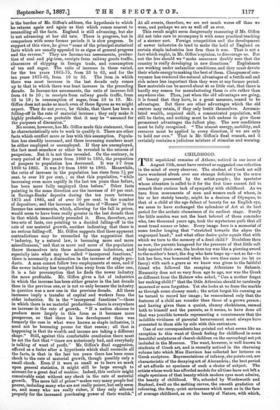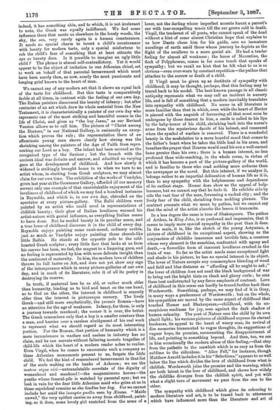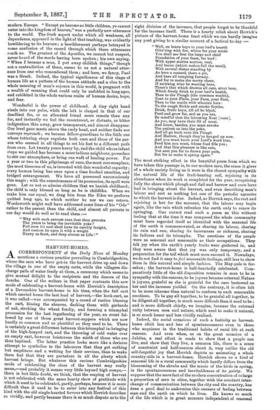CHILDHOOD.
THE sepulchral remains of Athens, noticed in our issue of August 13th, must have revived or suggested one reflection in the mind of every observer. The student of Greek art will have wondered afresh over one strange deficiency in the Renee of beauty possessed by the artist-people ; the spectator whose attention is called to it for the first time cannot fail to remark their curious lack of sympathy with childhood. As we turn from monuments of men and women each of whom, in his or her stately beauty, might be a denizen of Olympus, to that of a child at the age fullest of beauty for an English eye, we seem to have exchanged the splendour of Art at its best period for the archaic clumsiness of its earliest stage. Surely the little maiden was not the least beloved of those comrades who, two thousand years ago, took the mysterious path that all must tread sooner or later. Every image here is a memorial of some tender longing that "stretched towards the abyss the nngrasped hand ;" and what other desire quite equals that with which we turn to the memory of a dead child P Doubtless then as now, the parents hungered for the pressure of that little soft body against their own, the broken toy was like a piercing sword to the mother's heart, the dog who here leaps up—not so far—to lick her face, was honoured when his own time came (so let us fancy) with such a grave as we know was given to the faithful friend who followed the escaping Athenians to Salamis. Humanity does not so vary from age to age, nor was the Greek so different from the Hebrew who asked, "Can a mother forget her sucking child P" that the little Athenian should be carelessly mourned or soon forgotten. Yet she looks at us from the marble as through some clumsy mask ; the artist forgot his cunning as he turned to record her image; he remembered only that the features of a child are rounder than those of a grown person; and having given them a quaint, clumsy chubbiness, seemed both to himself and the parents, as it seems, to have done all that was possible towards representing a countenance that the indelible vividness of parental bereavement must always have presented to them side by side with this caricature.
One of our correspondents has pointed out what seems like an exception to this want of Greek feeling for childhood in some beautiful sculptures of cherub children on the sarcophagi not yet included in the Museum. The want, however, is well known to students of Greek art, and is recently noticed in the charming volume into which Miss Harrison has collected her lectures on Greek sculpture. Representations of infancy, she points out, are characteristic of the decaying art of Alexandria ; the best period of art affords no specimen of such a choice of subject. The artists whose work has afforded models for all time have not left a single specimen of that beauty which modern eyes most admire, the beauty of childhood. We, schooled by Wordsworth and Raphael, dwell on the melting curves, the smooth gradation of colouring, the deep, quiet seriousness which meet us in the face of average childhood, as on the beauty of Nature, with which, indeed, it has something akin, and to which, it is not irrelevant to note, the Greek was equally indifferent. We feel some influence there that meets us elsewhere in the lonely woods, the sky, the sea, very rarely again in a human countenance. It needs no special charm to invest a child's countenance With beauty for modern taste, only a special misfortune to rob the child's face of something that at least attracts the eye as beauty does. Is it possible to imagine an ugly little child P The phrase is almost self-contradictory. Yet it would appear to be the object of imitation to one Athenian chisel, set to work on behalf of that parental bereavement which must have been surely then, SB now, nearly the most passionate and longing grief known to the heart of man.
We cannot say of any modern art that it shows an equal lack of the taste for childhood. But this taste is comparatively feeble at all times, in contrast with the feeling of our own day. The Italian painters discovered the beauty of infancy; but after centuries of an art which drew its whole material from the New Testament, it is characteristically a painter of our own day who represents one of the most striking and beautiful scenes in the life of Christ, and gives us "the boy Jesus," as our Revised Version allows DB to call him. The picture of "Christ among the Doctors," in our National Gallery, is eminently an excep- tion which proves the rule ; the representation there of an effeminate young man shows clearly how strong was the shrinking among the painters of the Age of Faith from repre- senting our Lord as a boy. The infant had been secured as the recognised type of the Saviour ; but the breach with the ancient ideal was definite and narrow, and admitted no varying gaze at the development of childhood. And how slowly it widened is strikingly brought home to us when we tarn to an artist whom, in starting from Greek sculpture, we may almost claim for our own time. The exhibition of the works of Vandyke, given last year at the Grosvenor Gallery, afforded (if our memory serves) only one example of that unmistakable enjoyment of the loveliness of childhood of which we may find a hundred instances in Reynolds, and which is, in our own day, obtruded on the spectator at every picture-gallery. The Balbi children were painted by an artist who could revel in representations of childish beauty; their glow of Italian loveliness warmed his artist-nature with genial influence, as everything Italian seems to have done. But he needed beauty in its peculiar sense, and a true lover of childhood discovers it in the child of every day. Reynolds enjoys painting some snub-nosed, ordinary urchin, just as much as Vandyke enjoys painting those cherub-like little Balbis. He stands at the opposite pole to the cold- hearted Greek sculptor ; every little face that looks at us from his canvas has been, we feel, the magnet to a lingering gaze, and no feeling is represented by him with more delicate insight than the sentiment of maternity. In him, the modern love of children throws its fall lustre on Art, and does not yet show any sign of the intemperance which in many picture-galleries of our own day, and in much of its literature, robs it of all its poetry in destroying its reserve.
In truth, if maternal love be as old, or rather much older than humanity, binding us to bird and beast on the one hand, as to God on the other, the interest in childhood is scarcely older than the interest in picturesque scenery. The lively Greek—and still more emphatically, the prosaic Roman—have no attention for the age of weakness. Infancy, for them, is only a journey towards manhood ; the sooner it is over, the better. The Greek remembers only that a boy is a smaller creature than a man, and hurries over a careless abridgment of his real work to represent what we should regard as its most interesting portion. For the Roman, that portion of humanity which is a mere incumbrance in warfare and useless in industry has no claim, and he can narrate without faltering accents tragedies of child-life which the heart of a modern reader aches to realise. Even Virgil, when he comes to enumerate such a company as these Athenian monuments present to us, forgets the little child. We feel the hint of remembered bereavement in that list of the souls waiting on the banks of Acheron ; we see the makes atque yin—untranslatable correlate of the dignity of womanhood and manhood !—the magnanimous heroes—the youths whose funeral-pile is watched by parental eyes ; but we look in vain for the dear little Athenian maid who grins at us in these sepulchral remains as she fondles her dog. For we cannot include her amid the innupta3 paella seen by Rims. "Maids unwed," the very epithet carries us away from childhood, paint- ing, as it does, some lovely girl snatched from the arms of a lover, not the darling whose imperfect accents haunt a parent's ear with tear.compelling music till the ear grows cold in death. Virgil, the tenderest of all poets, who cannot speak of the dead without a hint of some almost Christian hope that explains to us how Dante chose him for his guide, sees no immature nurslings of earth amid those whose journey he depicts as the flight of the swallows to a more genial air. Be had a tender feeling for almost all weakness ; the horse of Mezentius, the flock of Polyphemus, comes in for some touch that speaks of sympathy; but we recall no hint that he felt what to us is so obvious—even over-worn by constant repetition—the pathos that attaches to the sorrow or death of a child.
If Virgil must be given up as destitute of sympathy with childhood, it may be thought, perhaps, that this feeling may be traced back to his model The best-known passage in all classic antiquity represents what we may call an incident in nursery life, and is full of something that a modern inevitably translates into sympathy with childhood. No scene in all literature is more familiar than that in which, even while the heart of Hector is pierced with the anguish of foreseeing all that must soon be undergone by those dearest to him, a smile is called to his lips by the baby-terror of his child, shrinking back into the nurse's arms from the mysterious dazzle of his helmet, and reassured when the symbol of warfare is removed. There is a wonderful beauty in the modulation to a more hopeful mood that comes to the father's heart when he takes the little load in his arms, and breathes the prayer that Heaven would send his son a well.earned fame greater than his own ; there is a human interest, no less profound than wide-reaching, in the whole scene, in virtue of which it has become a part of the picture-gallery of the world, and is familiar to those who read nothing more arduous than the newspaper or the novel. But this interest, if we analyse it, belongs rather to an impartial delineation of human life as it is, than to any sympathy with the helplessness and dependence of its earliest stage. Homer does show us the appeal of help- lessness, but we cannot say that he feels it. He exhibits side by side the vast fear of the man, foreseeing a sacked oity ; and the lively fear of the child, shrinking from nodding plumes. The contrast presents what we mean by pathos, but we cannot say that the mind of the artist absorbs the lesson it transmits.
In a less degree the same is true of Shakespeare. The pathos of Arthur, in King John, is so profound and impressive, that it seems to imply more speciaq sympathy in the poet than it does. In the main, it is, like the sketch of the young Astyanax, a picture of childhood in its exceptional aspect, showing us the conjunction of childlike innocence and terrible fate, a creature whose very element is the sunshine, confronted with agony and deatb,—a flowerlike form of innocent loveliness crashed in the train of war. So far as the artist needs some exceptional light and shade in his picture, he has no special interest in its object. The lover of Nature accepts any commonplace blending of wood and field and blue distance as "affording all he ought to ask;" the lover of children does not need the black background of war to bring out the bright tints on cheek and glossy curls ; he sees them best undistracted by any fierce emphasis of contrast. Love of childhood in this sense can hardly be traced further back than Wordsworth. Something, perhaps, we may find of it in Gray, in many ways a predecessor of Wordsworth ; but on the whole, his sympathies are moved by the same aspect of childhood that touched Homer and Shakespeare,—childhood, with its un- suspicious readiness for joy, seen against the dark shadow of human calamity. The poet of Nature sees the child by its own placid light ; his various pictures of childhood express its eternal freshness, its appeal to the heart of weary man, its revival of dim memories transmuted to vague thoughts, its suggestions of vaguer hope, its promise, surmounting the disappointment of life, and pointing to something beyond. And then, too, we see in him occasionally the modern abuse of this feeling,—that step from the pathetic to the mawkish which is as easy as from the sublime to the ridiculous. "Alice Fell," for instance, though Matthew Arnold includes it in his "Selections," appears to us well below the line which divides the love of childhood from what is childish. Wordsworth joins the promise and the warning, which are both latent in the love of childhood, and shows how widely the childlike diverges from the childish spirit, and yet with what a slight turn of movement we pass from the one to the other.
The sympathy with childhood which gives its colouring to modern literature and art, is to be traced back to utterances which have influenced more than the literature and art of
modern Europe. "Except ye become as little children, ye cannot enter into the kingdom of heaven," was a perfectly new utterance to the world. The fresh aspect under which all weakness, all dependence, appeared in the light of that teaching, was evidently bewildering to its hearers ; a bewilderment perhaps betrayed in some confusion of the record through which these utterances reach us. The greatest of the Apostles, we cannot but suspect, never heard of the words having been spoken ; his own saying, "When I became a man, I put away childish things," though not a contradiction of them, seems to us not a natural utter- ance from one who remembered them ; and here, we fancy, Paul was a Greek. Indeed, the typical significance of this stage of human life as a pattern of the human attitude and a clue to the whole meaning of man's sojourn in this world, is pregnant with a wealth of meaning that could only be unfolded in long ages, and exhibited in the whole various realm of human desire, hope, and fear.
Wonderful is the power of childhood. A tiny right hand steals into our palm, while the left is clasped in that of our deadliest foe, or an alienated friend more remote than any foe, and instantly we feel the resentment, or distaste, or bitter indignation thin away, grow transparent, and almost disappear. Our level gaze meets above the curly head, and neither finds nor conveys reproach ; we become fellow-guardians to the little one whose tottering steps regulate both ours and those of the per- son who seemed in all things to set his feet to a different path from ours. Let twenty years hurry by, End the child whose infant steps we guided has become a mere tedious neighbour, powerless to stir our atmosphere, or bring one waft of healing power. For a year or two in this pilgrimage of ours, the most commonplace, the most tiresome of us, is invested with this wonderful capacity ; every human being has once upon a time hushed enmities, and bridged estrangement. We have all possessed unconsciously this magic; with the consciousness of its possession, its spell were gone. Let us not so admire children that we banish childhood ; the child is only blessed so long as he is childlike. When we make him our equal, we drag him from the Eden we perforce quitted long ago, to which neither he nor we can return. Wordsworth might well have addressed some lines of his "Ode" rather to the parent than the child, and almost all parents in our day would do well so to read them :—
"Why with such earnest care lost thou provoke The years to bring the inevitable yoke' Fall soon his soul shall have its earthly freight, And custom lie upon it with a weight Heavy as frost, and deep almost as Life!"




































 Previous page
Previous page